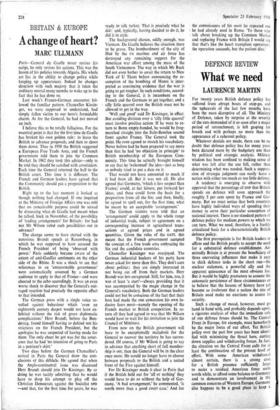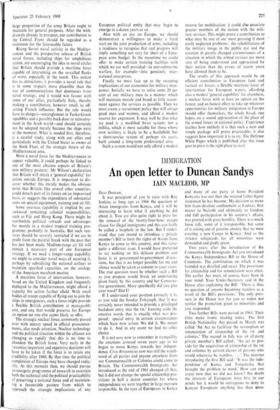What we need
DEFENCE REVIEW LAURENCE MARTIN
For twenty . years British defence policy has suffered from abrupt bouts of stop-go, and the upheavals of the last few months have been the most disruptive of all. The Ministry of Defence, taken by surprise at the severity of the cuts demanded of it so soon after a major period of retrenchment, is left gasping for breath and with perhaps no more than the appearance of a coherent policy.
Whatever denials are made, there can be no doubt that defence policy has for many years been dictated more by the budgetary axe than by political and strategic analysis. Military wisdom has been confined to making sense of what was left after the axe fell, rather than determining what was needed. Such a suppres- sion of strategic judgment can easily leave a nation with either too much or too little defence.
A tendency is emerging to observe with approval that the percentage of GNP that Britain spends on defence will soon approach the roughly 5 per cent spent by France and Ger- many. But we must notice that both countries have highly individual ways of spending their money to serve their particular conception of national interest. There is no standard pattern of defence policy for medium powers to which we can turn. What we need, therefore, is a freshly articulated basis for a characteristically British defence policy.
The first prerequisite is for British leaders to affirm and the British people to accept the need for a substantial defence establishment. Ad- mittedly Britain is at present the beneficiary of three enervating influences that make it easy to shirk defence tasks in the short run—the nuclear stalemate, a powerful ally and the apparent quiescence of the most obvious foe. But it would be highly premature to assume the automatic persistence of these circumstances or to believe that the lessons of history have yet become so irrelevant that a nation the size of Britain need make no exertions to assure its security.
Such a change of mood, however, must go hand in hand with, and probably depends upon, a rigorous analysis of what the immediate role of our defence forces should be. The Central Front in Europe, for example, must henceforth be the major focus of our effort. Yet British policy over the past few years has been identi- fied with minimising the threat here, cutting down supplies and withdrawing forces. In fact, the situation on the Central Front calls for at least the continuation of the present level of effort. With some American withdrawal almost certain, there is a strong case for a British presence sufficiently large to make a residual American force seem worth while, to afford some balance to Germany and to demonstrate an involvement in the common concerns of Western Europe. Germany also happens to be a good place to keep a large proportion of the army Britain ought to maintain for general purposes. After the with- drawals already in prospect, our contribution to the Central Front should be regarded as a minimum for the foreseeable future.
Rising Soviet naval activity in the Mediter- ranean and the prospective release of British naval forces, including ships for amphibious • action, are encouraging the idea in naval circles that Britain should provide a maritime force capable of intervening on the so-called flanks of NATO, especially in the south. This notion has its attractions; it provides a naval role that is in some respects more plausible than the war of communications that dominates NATO naval strategy, and it would win favour with some of our allies, particularly Italy, thereby making a contribution, however small, to off- setting French influence. But the role would have its dangers—entanglement in Turko-G reek squabbles and a possible back door to reinvolve- ment in the Arab world—and should certainly not be adopted merely because the ships exist at the moment. What is needed first, therefore, is a careful study; along with our allies and particularly with the United States as owner of the Sixth Fleet, of the strategic future of the Mediterranean area.
Were a naval force for the Mediterranean to appear valuable, it could perhaps be linked to one of the most obscure aspects of Britain's new military posture: Mr Wilson's declaration that Britain will retain a 'general capability' for action outside Europe. It is important to dis- cover whether this merely makes the obvious point that Britain, like several other countries, could detach part of its forces on an improvised basis, or suggests the expenditure of substantial sums on special equipment, training and air lift.
Some overseas capability is implied by our awkward remaining colonial responsibilities, such as Fiji and Hong Kong. There might be worthwhile political rewards and advantages for morale in a modest tropical training pro- gramme, probably in Australia. But such ven- tures should be severely restricted if we are to profit from the painful break with the past that has just been made. Medium-range air lift will remain a necessary part of our European strategy. If we need a longer-range capability we ought to consider novel ways of securing it, perhaps by subsidising the national airlines to Maintain specified capacities, on the analogy of the American merchant marine.
A maritime force of intervention, however, based on the United Kingdom and frequently deployed to the Mediterranean, might afford a capacity for action farther afield. With small bodies of troops capable of flying out to join the ships in emergencies, such a force might provide a flexible British contribution at manageable cost, and one that would preserve for Europe an option no one else seems likely to offer.
The strategic nuclear force, commonly passed over with uneasy speed in official pronounce- ments, also needs attention. Nuclear technology and the political situation within the alliance are changing so rapidly that this is no time to abandon the British force. Very early in the 'seventies important and expensive decisions will have to be taken if the force is to retain any credibility after 1980. By that time the political complexion of Europe may have changed radic. ally. At this moment then, we should pursue an energetic programme of research to ascertain both the technical and the political practicabjlity of preserving a national force and of maintain- ing a favourable posture from which to approach the strategic implications of any European political entity that may begin to emerge in a dozen years or so.
Also with an eye on Europe, we should demonstrate a willingness to make a fresh start on the joint production of arms, including a readiness to recognise that real progress will imply something not very far short of a Euro- pean arms budget. In the meantime we could offer to make certain training facilities with which we are well provided—in anti-submarine warfare, for example—into genuinely inter- national enterprises.
Finally we must face up to the sweeping implications of our economies for military man- power. Initially we have to retire some 20 per cent of our military men in a manner which will maintain morale and breed as little resent- ment against the services as possible. Then we must create a recruitment policy that will attract good men and women, and afford a modest reserve for expansion. It may well be that what we need is a modified Swiss system; not a militia, which is most suitable for those whose own territory is likely to be a battlefield, but a short-service system of perhaps six years, built around a long-term professional core.
Such a system would not only afford a modest
reserve for mobilisation; it could also associate greater numbers of the nation with the mili- tary services. This might prove a contribution to what may be one of our most pressing if most easily neglected problems: the rehabilitation of the military image in the public eye and the creation in greatly changed circumstances of a situation in which the armed services are more sure of being understood and appreciated by their nation than the events of recent years have allowed them to be.
The results of this approach would be an efficient contribution to European land and tactical air forces, a flexible maritime force of intervention for European waters, affording also a modest 'general capability' for elsewhere, a nuclear force with at least an option on the future, and an honest effort to take up whatever opportunities for military integration in Europe should offer themselves, the whole based, one hopes, on a sound appreciation of the place of the armed forces in national policy. Experience teaches how unlikely it is that such a neat and simple package will prove practicable; it also suggests how important it is to try. The Defence White Paper which is published after this issue goes to press is the right place to start.



































 Previous page
Previous page